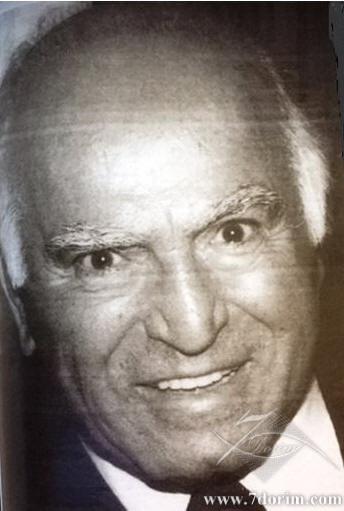
Mousa Beroukhim — French University Teacher at Tehran University, Head of the Foreign Languages Department of Farhangian University, Editor-in-Chief and Columnist at “Journal de Téhéran”
Born in 1914 in Tehran, Mousa Beroukhim came from a devout Jewish family in the Oudlajan neighborhood of the city. He was the first child of Alieh Qatan and Asher Beroukhim. His father was a faithful Jew and worked as a freelancer.
Mousa Beroukhim received his primary and first level of secondary education at Alliance School and successfully obtained a diploma in the French language. He then completed the second level of secondary education at Dar ul-Funun and entered the Faculty of Law and Political Sciences at the University of Tehran. A year later, he competed in the exams for European education scholarships by the government and came out with excellent points, being awarded a scholarship to study in France in 1931.
After obtaining his first and second Baccalauréat degrees in French language and literature, he pursued a Bachelor’s degree in philosophy at the University of Toulouse. Over two years, he received his philosophy degree in addition to certificates in various fields, including medieval history, modern history, political economics, administrative law, and international law. He then traveled to Dijon to pursue a doctorate in philosophy. During this period, he spent two years writing a detailed thesis in French, spanning four hundred pages, discussing the evolution of thoughts and beliefs throughout the history of Iran. Additionally, he authored other theses on Bergson’s philosophy and the Dreyfus affair. He completed his university studies and, notably, the French government later published his thesis as a book for scholars and researchers.
Mousa Beroukhim returned to Iran in 1938 after completing his studies. He immediately joined the Faculty of Literature at the University of Tehran as an assistant professor, eventually becoming a professor of French language at the same faculty. He served in this capacity for over thirty years despite religious biases, protests, and opposition. His service was such that he was awarded by Reza Shah and Mohammad Reza Shah (Kings of Iran) and other government officials. During this time, he also held positions as a professor and the head of the Foreign Languages Department at Tehran’s Teacher’s Training University, now known as Farhangian University. Since he was aware of the high value and importance that society considered for teaching, Mousa Beroukhim chose to be a teacher and continued to teach even after retiring from Tehran University. He was the head of the foreign languages department of the College of Literature and Foreign Languages and the School of Foreign Languages and Translation, now known as the Faculty of Persian Literature and Foreign Languages of Allameh University.
Dr. Mousa Beroukhim devoted over 25 years of his life to being a writer and the editor-in-chief of “Journal De Téhéran,” a new section of “Ettela’at Newspaper” printed in French. He passionately wrote numerous articles in French for the only foreign-language newspaper in Tehran at that time, presenting the history and culture of Iran to the world. Additionally, he contributed many literary, political, and social articles to various other media outlets. Some of his most notable works include “Zendegi Khaab-o Khiali Bish Nist” (i.e Life is Nothing but a Dream) and “Mash’al-e Khamoosh Shodeh” (i.e The Extinguished Torch), and translations of “Karname Ardashir Babakan” (a short prose tale written in the Sassanid period, narrating the story of Ardashir I, the founder of the Sassanid dynasty), excerpts from the works of Sadegh Hedayat, and the translation of “Ayena” (i.e. Mirror) by Moti al-Dawla Hejazi (known as Mohammad Hejazi) among others.
Dr. Beroukhim was also gifted in poetry and occasionally composed poems. He excelled in translating the works of renowned Iranian poets into French, notably producing remarkable translations of parts of the “Khamsa” by Nizami Ganjavi (specifically Khosrow o Shirin) and the “Shahnameh” by Ferdowsi, specifically the stories of Rostam and Sohrab and Bizhan o Manizheh, for theatrical performances in French. In recognition of his valuable services to French culture, particularly during World War II when he was at the University of Tehran and at “Journal De Téhéran,” the French government awarded him the title Officier d’Académie of the Ordre des Palmes académiques (i.e. Academic Officer Decoration of the Order of Academic Palms).
In late 1977, Dr. Mousa Beroukhim traveled to the United States to visit his children who were studying there. However, with the emergence of rumors about the Islamic Revolution in Iran, he decided not to return and settled permanently in New Jersey. Despite being in retirement, he remained active in cultural and social activities. In 1978, he began his collaboration with the Persian magazine New York, and contributed articles on global political issues, social matters, his memories of his university days, and contemporary societal topics. In 1992, the magazine honored this esteemed professor for his valuable services, presenting him with an appreciation award.
Mousa Beroukhim married Jamileh from the Melamed family in 1941. They had five daughters — Leili, Diana, Rachel, Shahnaz, Simon — and one son, Reuben, together. All of their children pursued higher education.
Dr. Mousa Beroukhim passed away in 1999 in New York, leaving a legacy of knowledge and enlightenment for all. He was a source of knowledge that kept everyone enlightened. In 2015, with the assistance of Simon Beroukhim, most of Mousa Beroukhim’s published articles were collected and published in a book titled “Khaterat-e Yek Ostad” (i.e. Memories of a Professor), making his work accessible to those interested in the history and culture of the Jewish community in Iran. According to Simon Beroukhim, the purpose of compiling this book was to preserve her father’s valuable writings for future generations, since he was a cultured personality considered one of the honors of the Iranian Jewish community.

Dr Moussa Brookhim
